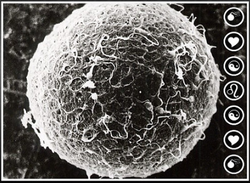
Would be egg donors could be in for a greater incentive as of today as the decision to raise the current amount given to cover travel costs and loss of earnings. It is illegal in the UK to pay for eggs or sperm; instead donors are offered £61.28 for each full day. This can rise to £250 per course or cycle of donation, alongside travel expenses.
Donor numbers are low in this country and waiting lists for donated eggs are on the rise. To counteract the shortage of donors the Human Fertilisation and Embryology Authority (HFEA) will decide today whether to pay £750 to egg donors.
Concerns have been raised that a financial incentive might cause potential donors to ignore the invasive procedures of egg donation. However the waiting list of up to 5 years is driving some abroad where all donors are paid, such as America. And we all remember what happened in Dawson's Creek when Henry donated too much blood to pay for a date with Jen. I expect.
The process for women to donate eggs can’t even begin until the woman has undergone blood pressure tests and psychological evaluations. Then the donor is given a course of hormones which suppress their menstrual cycle and stimulate the growth and maturation of eggs. Once the eggs are ready they are harvested (oh, for a word that doesn’t bring to mind a cornfield in the ovaries-it sounds itchy) under either general or local anaesthetic though a needle injected into the vagina.
As with all hormone treatments there are risks. Women are likely to suffer from mood swings, bloating and pain and in some rare cases have a severe reaction to the hormones.
The British Fertility Society chair Tony Rutherford welcomes the suggested changes opposing the fear it will turn egg donation into a commodity, "The level of compensation should be raised so that it is commensurate with what a donor has to go through." Under the current regulations women stand to make a financial loss when they undergo the invasive procedure of donating their eggs. Whether or not the donation is made purely out of the kindness of their hearts this is not to be ignored.
Kate
Donor numbers are low in this country and waiting lists for donated eggs are on the rise. To counteract the shortage of donors the Human Fertilisation and Embryology Authority (HFEA) will decide today whether to pay £750 to egg donors.
Concerns have been raised that a financial incentive might cause potential donors to ignore the invasive procedures of egg donation. However the waiting list of up to 5 years is driving some abroad where all donors are paid, such as America. And we all remember what happened in Dawson's Creek when Henry donated too much blood to pay for a date with Jen. I expect.
The process for women to donate eggs can’t even begin until the woman has undergone blood pressure tests and psychological evaluations. Then the donor is given a course of hormones which suppress their menstrual cycle and stimulate the growth and maturation of eggs. Once the eggs are ready they are harvested (oh, for a word that doesn’t bring to mind a cornfield in the ovaries-it sounds itchy) under either general or local anaesthetic though a needle injected into the vagina.
As with all hormone treatments there are risks. Women are likely to suffer from mood swings, bloating and pain and in some rare cases have a severe reaction to the hormones.
The British Fertility Society chair Tony Rutherford welcomes the suggested changes opposing the fear it will turn egg donation into a commodity, "The level of compensation should be raised so that it is commensurate with what a donor has to go through." Under the current regulations women stand to make a financial loss when they undergo the invasive procedure of donating their eggs. Whether or not the donation is made purely out of the kindness of their hearts this is not to be ignored.
Kate
 RSS Feed
RSS Feed
